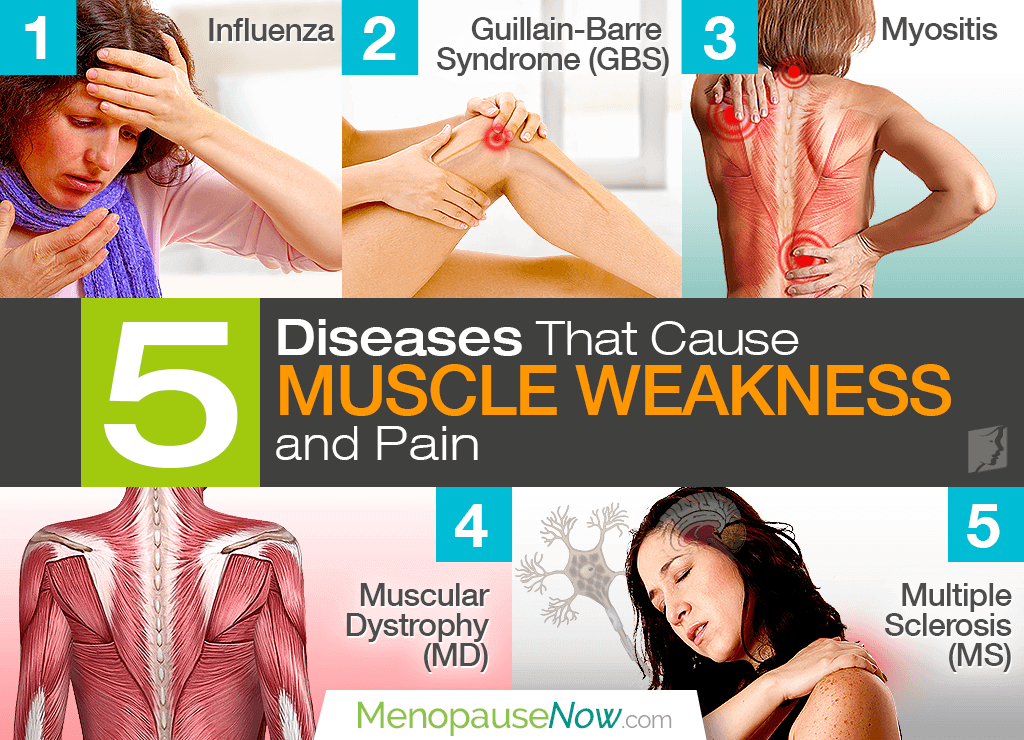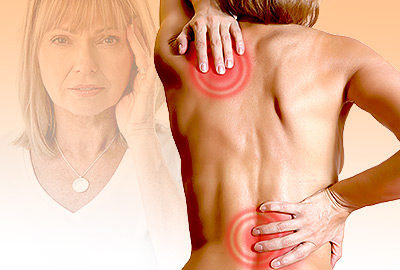It is estimated that up to 85% of people have experienced muscle pain at some point in their life.1 However, only some of them also report muscle weakness, a highly debilitating symptom that might have a wide variety of causes. Read on to discover five diseases that cause muscle pain and weakness so that you are a step closer towards finding the help you need.
Influenza
Feeling tired and experiencing muscle pain and weakness are often early flu symptoms. Influenza (flu) viruses are highly contagious and can spread quickly among people. Other symptoms may include headaches, cough, and chills, most of which can last from a few days up to two weeks.
Guillain-Barré Syndrome (GBS)
This rare disorder involves a malfunction within the immune system, which often occurs after a viral or bacterial infection. Because GBS causes damage to nerves, women may report weakened or painful muscles, often starting in the legs and traveling up to the arms. Other symptoms can include tingling extremities, loss of balance, or reduced bladder control.
Myositis
Myositits, or muscle inflammation, can occur after an infection or injury, or due to an autoimmune disease. It damages muscle fibers, resulting in muscle weakness and pain; loss of balance; trouble getting up from a chair; fatigue; and difficulty swallowing or breathing. Some types of myositis also cause a rash or other skin changes.
Muscular Dystrophy (MD)
There are more than 30 genetic conditions that fall under the umbrella term of muscular dystrophy, the most common one being Duchenne MD.2 While each type has its own causes and characteristics, all involve the deterioration of skeletal muscles and bring about progressive muscles weakness, pain, and, eventually, loss of muscle control.
Multiple Sclerosis (MS)
Among the diseases that cause muscle weakness and pain is MS, a disease of the nervous system that leads to nerve damage. It is characterized by muscle numbness or weakness; tremors; painful electric shock-like sensations in the muscles; and fatigue, among other symptoms affecting a woman's speech or vision.
Conclusions
While the aforementioned diseases that cause muscle pain and weakness can happen to anyone, middle-aged women's discomforts, such as electric shocks in the muscles; tingling extremities; or muscle tension or pain, are most commonly related to hormonal fluctuations during menopause. As such, once they get clearance from their doctors, women are encouraged to explore effective muscle tension treatments that can bring the desired results in no time!
Sources
- Communicable Disease Control and Prevention. (n.d.). Flu (Influenza). Retrieved March 2, 2020 from http://www.sfcdcp.org/flufacts.html
- Mayo Clinic. (2020). Guillain-Barré syndrome. Retrieved March 2, 2020 from https://www.mayoclinic.org/diseases-conditions/guillain-barre-syndrome/symptoms-causes/syc-20362793
- Medline Plus. (2020). Muscle Disorders. Retrieved March 2, 2020 from https://medlineplus.gov/muscledisorders.html
- National Health Service UK. (2015). Muscular dystrophy - Types. Retrieved March 2, 2020 from http://www.nhs.uk/Conditions/Muscular-dystrophy/Pages/Symptoms.aspx
- National Health Service UK. (2016). Multiple sclerosis - Symptoms. Retrieved March 2, 2020 from http://www.nhs.uk/Conditions/Multiple-sclerosis/Pages/Symptoms.aspx
Footnotes:
- Deutsches Ärzteblatt International. (2008). Muscle Pain: Mechanisms and Clinical Significance. Retrieved March 2, 2020 from https://www.ncbi.nlm.nih.gov/pmc/articles/PMC2696782/
- National Institute of Neurological Disorders and Stroke. (2019). Muscular Dystrophy Information Page. Retrieved March 2, 2020 from https://www.ninds.nih.gov/Disorders/All-Disorders/Muscular-Dystrophy-Information-Page


